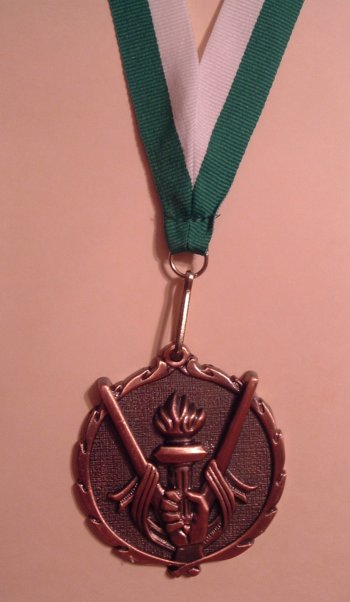
by John P. Pratt
Other Utah Valley Tournament Results
 |
Two new events were added this year, an "Age 70+" and an "A Doubles," making fifteen events completed on seven tables in just one day, from 9:00 a.m. to 6:30 p.m. It is the only tournament in Utah with an event for Women, Youth, and Mixed Doubles. Events with more than four entries used the new Rapid Ranker format (explained below), which replaces the Double Elimination format used previously for Doubles and the Round Robin used for Division Singles. The Rapid Ranker allows all players to play at least three matches in each event, ranks all contestants, has no scheduling bottlenecks, and yet usually requires no more matches than the Double Elimination. Events with four or fewer entrants used the Round Robin format. Matches were the best 3 out of 5 games.
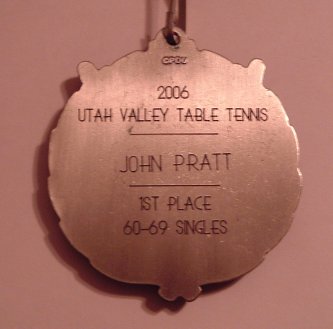 |
Here is an example of how the new Rapid Ranker Tournament works. All of the contestants are given a preliminary ranking, which should be accurate to within a few places (but could also be random). For simplicity, suppose that each of 8 contestants has an ability measured by the beginning letter of their first name, with Alice being the best player (starts with "A") and Harold the worst. They are listed in that initial ranking order in the "Round 1" column. The number of their first opponent is given after their name. Those opponent numbers are preprinted on the tournament sheet, so players can look ahead to know who they might be playing. In this case, Ellen (#1) plays Carol (#3) first, and Dale (#2) plays Gloria (#4). If the lower ranked player wins then the two trade places in the next round. In this case Carol upset Ellen so they swap places in Round 2, but Dale beat to Gloria, so they stay in the same slots.
| Round 1 | vs | Round 2 | vs | Round 3 | vs | Round 4 | vs | Final Rank |
|---|---|---|---|---|---|---|---|---|
| 1. Ellen | 3 | 1. Carol | 8 | 1. Carol | 4 | 1. Alice | 2 | 1. Alice |
| 2. Dale | 4 | 2. Dale | 7 | 2. Dale | 3 | 2. Bill | 1 | 2. Bill |
| 3. Carol | 1 | 3. Ellen | 6 | 3. Bill | 2 | 3. Dale | 4 | 3. Carol |
| 4. Gloria | 2 | 4. Gloria | 5 | 4. Alice | 1 | 4. Carol | 3 | 4. Dale |
| 5. Alice | 7 | 5. Alice | 4 | 5. Gloria | 8 | 5. Fred | 6 | 5. Ellen |
| 6. Fred | 8 | 6. Bill | 3 | 6. Ellen | 7 | 6. Ellen | 5 | 6. Fred |
| 7. Harold | 5 | 7. Harold | 2 | 7. Harold | 6 | 7. Harold | 8 | 7. Gloria |
| 8. Bill | 6 | 8. Fred | 1 | 8. Fred | 5 | 8. Gloria | 7 | 8. Harold |
There are four rounds, and each player gets to play four matches. While no one is eliminated after two matches, it is not the number of wins that counts, but it is more important who the opponent was. In particular, with 8 players, the second round determines the "Final Four" who will be playing for the medals. Anyone who loses the second round is out of the medals, even though they win all three other matches. (That is not true if there are only 5-6 entrants.) This came as a surprise to the entrants, but this example shows how well the scheme works, as do the actual matches listed below. To get ready for the big second round, the purpose of Round 1 is to pair up the best players to play Round Two, especially in slots #3-6, because #4 plays #5 and #3 plays #6 to see who will be in the Final Four. In every case, entrants #3 and 4 both lost their Round 1, and #5 and #6 both won Round 1, so those matches should be close.
Continuing this example, we see that in Round 2, #5 Alice beat #4 Gloria, and #6 Bill upset #3 Ellen. The Rapid Ranker is designed for sports where the #1 entrants is really expected to beat the #8 entrant (they play in Round 2), but even in the case of poor initial ranking, or of very close playing skills, the tournament still produces a final ranking at least as good as any other tournament except a Round Robin, with would require 28 matches for 8 entrants, rather than only 16. If you continue to follow this example through, you see that all 8 contestants ended up perfectly ranked. Sometimes one or two are off by one place, but overall, the Rapid Ranker does a great job. Note also that in the last round, everyone always plays someone right next to them in rank, so they should all have a close last match. Hopefully, this tournament will be for fun for all, including the lower ranked players who might battle hard just not to end up at the very bottom. For a detailed comparison to other tournament formats, see "The Rapid Ranker Tournament is Fun."
There is one more rule. After the last round, if there are any two adjacent players who did not play in the last round but played earlier, then their rank is adjusted to match the last time they played. That did not happen in this example, but it did in the Age 40-49 Singles in this tournament. Often it is the case where there is a complete chain at the end, where #1 beat #2, #2 beat #3, etc. all the way to the bottom, as happened in the Open Singles, "A" Singles, and "C" Singles events.
One other feature is the "Expedite Option" which is that if time is short, then it can be decided that each pair only plays each other once. That is, it they are scheduled to play a second time, the results of the first match is simply written in. No pair was scheduled twice in this example (as is usually the case), but it did happen in the championship match of the "A" Singles in this tournament. When the Expedite Option is invoked, players should be notified that even their first match might take the place of a final medal match. Now let's see how this tournament worked in its first use in a real tournament.
Preliminary ranking in the events was done either by 1) national rating, 2) results of earlier matches today, 3) results from last year's matches, or 4) estimating by watching players in a practice round. After a preliminary ranking of all entrants was completed, the Division Singles was divided into Open, A, B, C, and D divisions by having players near the bottom of one division play those at the top of the next lower division. If the lower player prevailed, then they swapped places in the divisions. There was not time to play an entire preliminary round, but most agreed that this method was sufficient. The national rating of each player, if any, is given in parentheses after their name. Ratings are such that higher ratings are better, and usually the difference of 100 points means the higher player will usually win (the Age 50-59 is an example). Because of time constraints, the Expedite Option was invoked, so that each pair only played once per event.
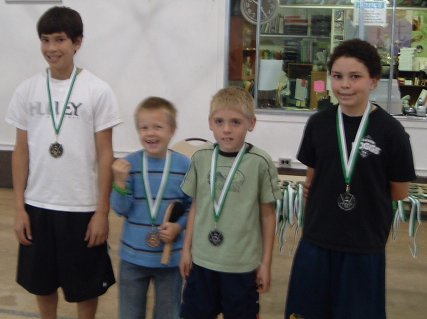
|
| Name | A | B | C | D | W-L | Rank |
|---|---|---|---|---|---|---|
| A. Tyler | XXX | W-3 | W-3 | W-3 | 3-0 | 1 |
| B. Scott | L-3 | XXX | W-3 | W-3 | 2-1 | 2 |
| C. Colin | L-3 | L-3 | XXX | L-3 | 0-3 | 4 |
| D. Hayden | L-3 | L-3 | W-3 | XXX | 1-2 | 3 |
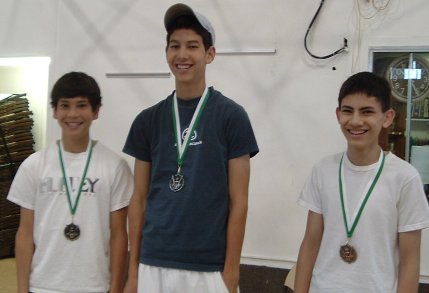
|
| Name | A | B | C | W-L | Rank |
|---|---|---|---|---|---|
| A. Spencer | XXX | L-5 | W-4 | 1-1 | 2 |
| B. Tyler | W-5 | XXX | W-3 | 2-0 | 1 |
| C. Benjamin | L-4 | L-3 | XXX | 0-2 | 3 |
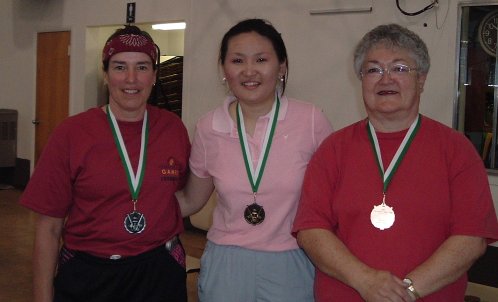
|
| Name | A | B | C | D | W-L | Rank |
|---|---|---|---|---|---|---|
| A. Meg | XXX | W-5 | W-3 | W-3 | 3-0 | 1 |
| B. Carol | L-5 | XXX | W-3 | W-3 | 2-1 | 2 |
| C. Diane | L-3 | L-3 | XXX | W-3 | 1-2 | 3 |
| D. Ruth | L-3 | L-3 | L-3 | XXX | 0-3 | 4 |

|
| Round 1 | vs | Round 2 | vs | Round 3 | vs | Round 4 | vs | Final Rank |
|---|---|---|---|---|---|---|---|---|
| 1. Bernie | 3 | 1. Sami | bye | 1. Sami | 4 | 1. Sami | 2 | 1. Sami |
| 2. Carol | 4 | 2. Carol | 7 | 2. Ray | 3 | 2. Bernie | 1 | 2. Bernie |
| 3. Sami | 1 | 3. Bernie | 6 | 3. Bernie | 2 | 3. Ray | 4 | 3. Sean |
| 4. Sean | 2 | 4. Sean | 5 | 4. Sean | 1 | 4. Sean | 3 | 4. Thuan |
| 5. Ray | 7 | 5. Thuan | 4 | 5. Thuan | bye | 5. Thuan | 6 | 5. Ray |
| 6. Leroy | bye | 6. Leroy | 3 | 6. bye | 7 | 6. Carol | 5 | 6. Carol |
| 7. Thuan | 5 | 7. Ray | 2 | 7. Carol | 6 | 7. bye | bye | 7. bye |
Because this is the first Rapid Ranker match, it might be well to look at how it works. Bernie was pre-ranked as top seed, and the 3 in the next column indicates that he would first play Sami (rank #3). Sami prevailed in that match, so in the next round they traded places, with Sami ranked first and Bernie third. That is all there is to it (there is a more complete tournament description above). In the final ranking, any adjacent players who have played each other have their rankings adjusted to match that result. Look at the final results for rank 4 and 5. #3 Ray lost to #4 Sean in Round 4. That put Ray at #4 and Thuan was at #5. But Thuan beat Ray in Round 1, so their places are reversed in the final ranking, with Thuan ending up #4, with Ray #5. Note also that even though Ray was raised all the way from 7th to 2nd in Round 2 by beating Carol, the tournament gradually brought him back down to the place immediately above her.
This match raised the question of whether or not to wait for someone who is late. Most tournaments allow an event to start, with a player arriving afterward, if the tardiness does not otherwise delay the event. Leroy Bybee (1492) was seeded to have a "bye" anyway in the first round, so it was decided to allow him to play if he arrived in time. After Round 2, it was clear he was not coming, so he was then moved to the bottom as a "bye." In this event, that didn't make much difference, but if he had been seeded in the top half, then it would have unnecessarily put a low ranked player at the top. So it was decided that in the Rapid Ranker format, a player must be present before play begins in order to use the proper format. The problem still must be solved as to what to do if a player must default all matches after play has begun.
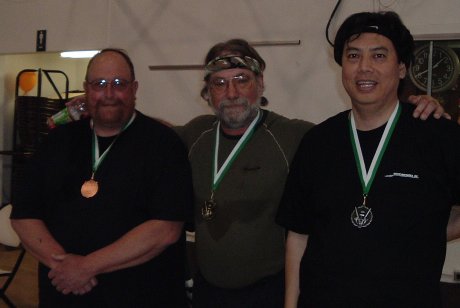
|
| Round 1 | vs | Round 2 | vs | Round 3 | vs | Round 4 | vs | Final Rank |
|---|---|---|---|---|---|---|---|---|
| 1. Byron | 3 | 1. Byron | bye | 1. Byron | 4 | 1. Byron | 2 | 1. Byron |
| 2. James | 4 | 2. James | 7 | 2. James | 3 | 2. James | 1 | 2. James |
| 3. Andy | 1 | 3. Andy | 6 | 3. Andy | 2 | 3. Andy | 4 | 3. Jeff |
| 4. Jeff | 2 | 4. Jeff | 5 | 4. Jeff | 1 | 4. Jeff | 3 | 4. Andy |
| 5. Steve | 7 | 5. Steve | 4 | 5. Steve | bye | 5. Steve | 6 | 5. Steve |
| 6. Rick | bye | 6. Rick | 3 | 6. Rick | 7 | 6. Rick | 5 | 6. Rick |
| 7. Howard | 5 | 7. Howard | 2 | 7. Howard | 6 | 7. Howard | bye | 7. Howard |
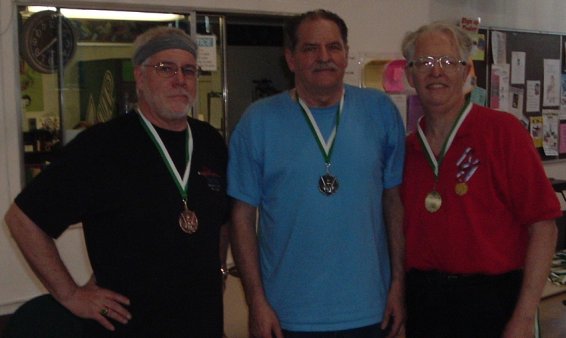
|
| Name | A | B | C | Match W-L |
Game W-L |
Rank |
|---|---|---|---|---|---|---|
| A. Craig | XXX | W-5 | L-3 | 1-1 | 3-5 | 3 |
| B. John | L-5 | XXX | W-3 | 1-1 | 5-3 | 1 |
| C. Tom | W-3 | L-3 | XXX | 1-1 | 3-3 | 2 |
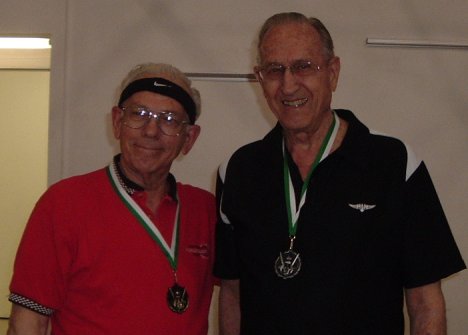
|
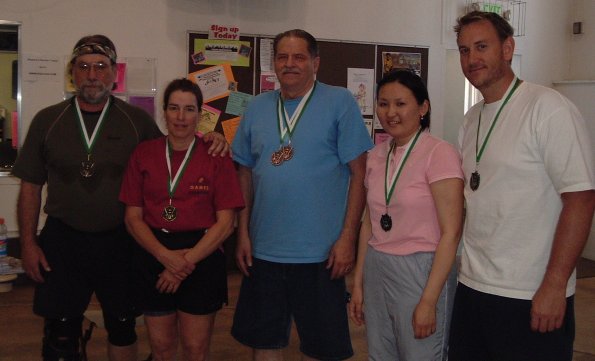
|
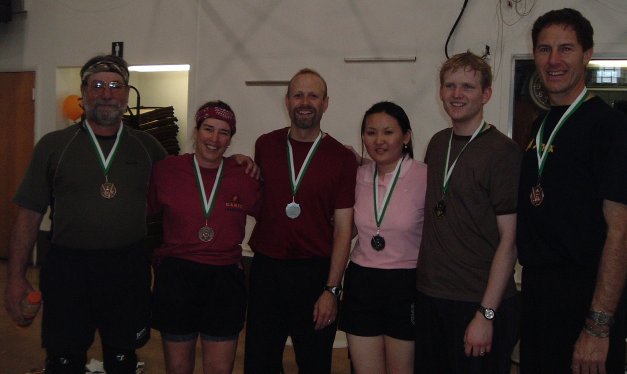
|
| Round 1 | vs | Round 2 | vs | Round 3 | vs | Final Rank |
|---|---|---|---|---|---|---|
| 1. Byron/Carol | 4 | 1. Jeff/Steve | 6 | 1. Bernie/Nathan | 2 | 1. Bernie/Nathan |
| 2. Meg/Sami | 5 | 2. Meg/Sami | 3 | 2. Meg/Sami | 1 | 2. Meg/Sami |
| 3. Andy/Ray | 6 | 3. Andy/Ray | 2 | 3. Andy/Ray | 4 | 3. Byron/Carol |
| 4. Jeff/Steve | 1 | 4. Byron/Carol | 5 | 4. Byron/Carol | 3 | 4. Andy/Ray |
| 5. Craig/Haris | 2 | 5. Craig/Haris | 4 | 5. Craig/Haris | 6 | 5. Craig/Haris |
| 6. Bernie/Nathan | 3 | 6. Bernie/Nathan | 1 | 6. Jeff/Steve | 5 | 6. Jeff/Steve |
This was an incredibly closely matched contest. The team that won was seeded at the bottom, and it was seeded correctly according to national ratings and earlier performances in this tournament. It is well known that doubles play cannot be estimated well by merely combining the ratings of each player. Only a full Round Robin could have ranked these teams perfectly, but time only allowed for a 9-match Rapid Ranker. While the final outcome of this event was probably as good as any (all teams had at least one loss), it left Jeff and Steve in shell shock after the roller coaster ride of having been seeded fourth, then becoming first by knocking off the top-seeded Davises, and then being sent to the basement when losing to Bernie and Nathan. Bewildered at how this could happen, they defaulted on their last match. Review of this event has led to the decision that if entrants are closely ranked, then the full 4-round Rapid Ranker should be used, as was done in the Division Singles. It does not shift any entrant by more than one place in the last two rounds. But Bernie and Nathan has as good a claim as any to win, because they beat Meg and Sami, who had beaten Andy and Ray, who in turn had beaten Bernie and Nathan.
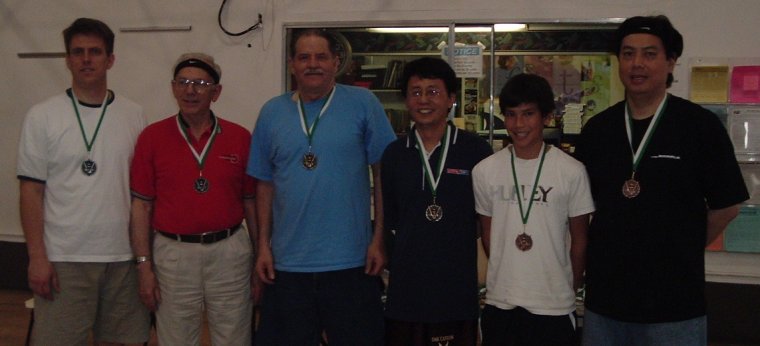
|
| Round 1 | vs | Round 2 | vs | Round 3 | vs | Final Rank |
|---|---|---|---|---|---|---|
| 1. Grant/Matt | 4 | 1. Grant/Matt | 6 | 1. Grant/Matt | 2 | 1. Sean/Tom |
| 2. Sean/Tom | 5 | 2. Sean/Tom | 3 | 2. Sean/Tom | 1 | 2. Grant/Matt |
| 3. James/Tyler | 6 | 3. James/Tyler | 2 | 3. James/Tyler | 4 | 3. James/Tyler |
| 4. Rick/Scott | 1 | 4. Rick/Scott | 5 | 4. Rick/Scott | 3 | 4. Rick/Scott |
| 5. Justin/Matt | 2 | 5. Justin/Matt | 4 | 5. Justin/Matt | 6 | 5. Justin/Matt |
| 6. Howard/Ben | 3 | 6. Howard/Ben | 1 | 6. Howard/Ben | 5 | 6. Howard/Ben |
This was a contest almost entirely composed of family teams. Next year we are considering having a "Family Doubles" category, which allow any two members of the same family to compete as a team. In this contest, the short 3-Round Rapid Ranker was appropriate because there was a wide range of skill levels. Note that it required fewer matches than a Double Elimination format (9 instead of 11), and yet allowed all entrants to have three matches instead of only two. It is also much easier to schedule, being assigned to three tables simultaneously. A double elimination has a bottle-neck in the loser's bracket which often results in unused tables in a small tournament.

|
| Round 1 | vs | Round 2 | vs | Round 3 | vs | Round 4 | vs | Final Rank |
|---|---|---|---|---|---|---|---|---|
| 1. Byron | 3 | 1. Byron | bye | 1. Byron | 4 | 1. Byron | 2 | 1. Byron |
| 2. Meg | 4 | 2. Meg | 7 | 2. Meg | 3 | 2. Andy | 1 | 2. Andy |
| 3. James | 1 | 3. James | 6 | 3. Andy | 2 | 3. Meg | 4 | 3. Meg |
| 4. Rainer | 2 | 4. Rainer | 5 | 4. Jeff | 1 | 4. Jeff | 3 | 4. Jeff |
| 5. Jeff | 7 | 5. Jeff | 4 | 5. Rainer | bye | 5. Rainer | 6 | 5. Rainer |
| 6. Andy | bye | 6. Andy | 3 | 6. James | 7 | 6. James | 5 | 6. James |
| 7. Sami | 5 | 7. Sami | 2 | 7. Sami | 6 | 7. Sami | bye | 7. Sami |
There were only a few upsets in this event. Note that there is a complete chain of wins: #1 Byron beat #2 Andy (Round 4), who beat #3 Meg (Round 3), who beat #4 Jeff (Round 4), who beat #5 Rainer (Round 2), who beat #6 James (Round 4), who beat #7 Sami (Round 3).
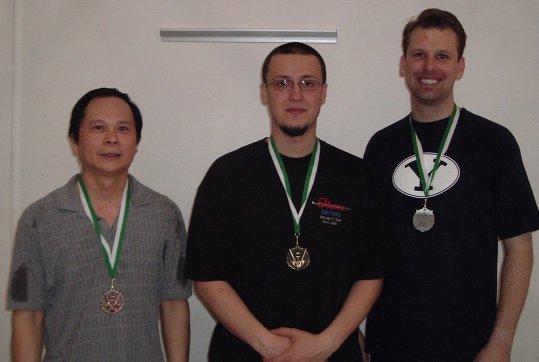
|
| Round 1 | vs | Round 2 | vs | Round 3 | vs | Round 4 | vs | Final Rank |
|---|---|---|---|---|---|---|---|---|
| 1. Bernie | 3 | 1. Bernie | bye | 1. Bernie | 4 | 1. Haris | 2 | 1. Haris |
| 2. Ray | 4 | 2. Carol | 7 | 2. Dan | 3 | 2. Dan | 1 | 2. Dan |
| 3. John | 1 | 3. John | 6 | 3. Thuan | 2 | 3. Thuan | 4 | 3. Thuan |
| 4. Carol | 2 | 4. Ray | 5 | 4. Haris | 1 | 4. Bernie | 3 | 4. Bernie |
| 5. Dan | 7 | 5. Haris | 4 | 5. Ray | bye | 5. Carol | 6 | 5. John |
| 6. Thuan | bye | 6. Thuan | 3 | 6. John | 7 | 6. John | 5 | 6. Carol |
| 7. Haris | 5 | 7. Dan | 2 | 7. Carol | 6 | 7. Ray | bye | 7. Ray |
Note that in this event, even though there were a lot of major upsets (such as the bottom seeded player winning), the final ranking again formed one continuous chain: Haris beat Dan who beat Thuan who beat Bernie who beat John who beat Carol who beat Ray. That is a strong feature of this tournament format; it often has an actual match between all final places. A Round Robin would have required 21 matches for 7 contestants, but the Rapid Ranker selected out those needed to rank all contestants correctly in only 12 matches.
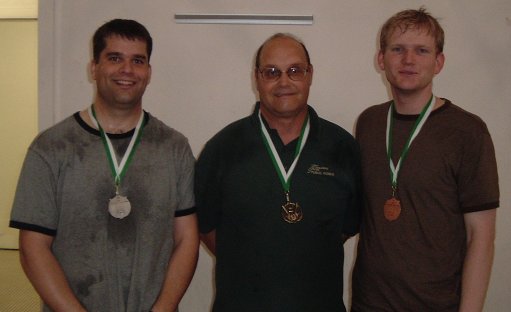
|
| Round 1 | vs | Round 2 | vs | Round 3 | vs | Round 4 | vs | Final Rank |
|---|---|---|---|---|---|---|---|---|
| 1. Steve | 5 | 1. Steve | 3 | 1. Rick | bye | 1. Rick | 2 | 1. Rick |
| 2. Craig | 4 | 2. Eric | 5 | 2. Eric | 3 | 2. Eric | 1 | 2. Eric |
| 3. Rick | 6 | 3. Rick | 1 | 3. Steve | 2 | 3. Steve | 4 | 3. Nathan |
| 4. Eric | 2 | 4. Craig | 6 | 4. Nathan | 5 | 4. Nathan | 3 | 4. Steve |
| 5. Merrill | 1 | 5. Merrill | 2 | 5. Merrill | 4 | 5. Merrill | 6 | 5. Merrill |
| 6. Nathan | 3 | 6. Nathan | 4 | 6. Craig | bye | 6. Craig | 5 | 6. Craig |
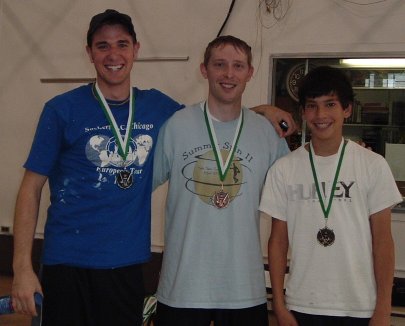
|
| Round 1 | vs | Round 2 | vs | Round 3 | vs | Round 4 | vs | Final Rank |
|---|---|---|---|---|---|---|---|---|
| 1. Vince | 5 | 1. Tyler | 3 | 1. Tyler | bye | 1. Tyler | 2 | 1. Tyler |
| 2. Calvin | 4 | 2. Calvin | 5 | 2. Calvin | 3 | 2. Matt | 1 | 2. Matt |
| 3. Matt | 6 | 3. Matt | 1 | 3. Matt | 2 | 3. Calvin | 4 | 3. Calvin |
| 4. Tim | 2 | 4. Tim | 6 | 4. Tim | 5 | 4. Tim | 3 | 4. Tim |
| 5. Tyler | 1 | 5. Vince | 2 | 5. Vince | 4 | 5. Vince | 6 | 5. Justin |
| 6. Justin | 3 | 6. Justin | 4 | 6. Justin | bye | 6. Justin | 5 | 6. Vince |
Tyler winning the "C" Singles distinguishes him as the first player to win the Gold in three Singles events in one Utah Valley Tournament. Congratulations!
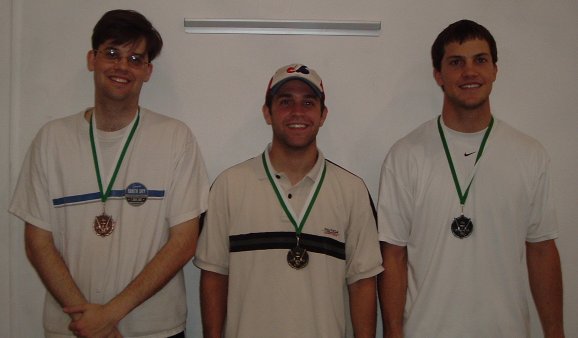
|
| Round 1 | vs | Round 2 | vs | Round 3 | vs | Round 4 | vs | Final Rank |
|---|---|---|---|---|---|---|---|---|
| 1. Matt | 5 | 1. Matt | 3 | 1. Matt | bye | 1. Matt | 2 | 1. Brett |
| 2. Nathan | 4 | 2. Brett | 5 | 2. Brett | 3 | 2. Brett | 1 | 2. Matt |
| 3. Howard | bye | 3. Howard | 1 | 3. Howard | 2 | 3. Howard | 4 | 3. Nathan |
| 4. Brett | 2 | 4. Nathan | bye | 4. Nathan | 5 | 4. Nathan | 3 | 4. Howard |
| 5. Benjamin | 1 | 5. Benjamin | 2 | 5. Benjamin | 4 | 5. Benjamin | bye | 5. Benjamin |